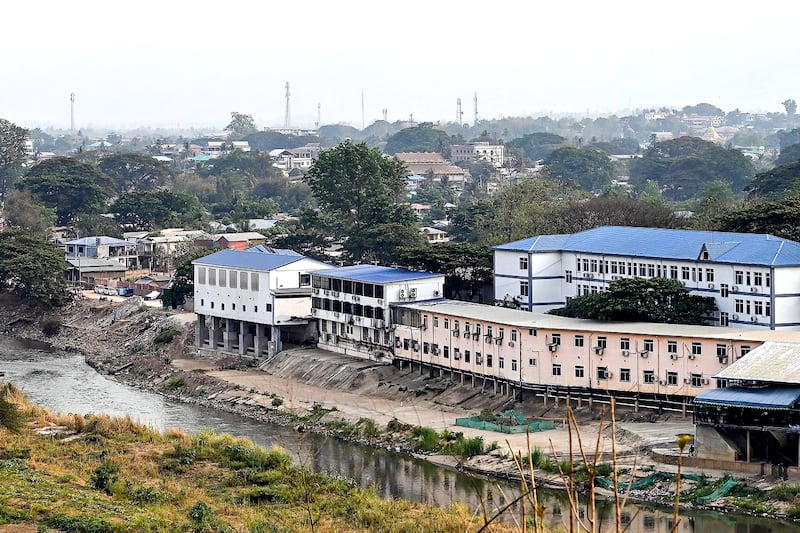UPDATED at 1:39 P.M. ET on 02-05-2025
BANGKOK - Thailand cut power to five locations along its border with Myanmar on Wednesday in its most decisive action ever against transnational crime syndicates accused of massive fraud and forced labor, but the lights remained on in at least one town, as residents appeared to generate their own electricity.
The five areas all host online scam centers that have proliferated in lawless corners of Southeast Asia since the COVID-19 outbreak in 2020, when many casinos turned to online fraud operations, often staffed by unsuspecting job-seekers lured by false offers of work, to make up for lost gamblers.
“PEA has successfully suspended power supply to all five connection points with Myanmar, from Chiang Rai to Tak and Kanchanaburi,” Deputy Prime Minister and Interior Minister Anutin Charnvirakul said, referring to the Provincial Electricity Authority and Thai border provinces.
“This action follows the National Security Council meeting’s resolution from yesterday evening.”
The power cut at 9:00 a.m. affects Myanmar’s Payathonzu in Mon state, Ban Muang Daeng and the Thai-Myanmar Friendship Bridge in Tachileik, Shan state, and the eastern town of Myawaddy in Kayin state, he said.

However, still images and video footage taken by an RFA Burmese reporter who traveled to Myawaddy late on Wednesday showed it was business as usual at one of the enclaves — the Yatai Shwe Kokko Special Economic Zone in Myawaddy, operated by China’s Yatai International Holding Group and an ethnic minority militia known as the Border Guard Force, or BGF, which is backed by the Myanmar junta.
Residents of the zone are believed to have deployed gas-fed generators to keep the lights twinkling into the night — much like those used in other parts of the country where electricity has been disrupted amid widespread blackouts.
Electricity production has dropped by at least a third in Myanmar since the 2021 coup d'état, a decline that analysts attribute to economic mismanagement.
The scam centers in eastern Myanmar have been powered by electricity and internet services from Thailand for years, and while Thai authorities had raised the possibility before of cutting off utilities, a recent flurry of bad press preceded Wednesday’s action.

The rescue of a Chinese actor from a Myanmar fraud center last month raised international alarm about the centers, which are often run by ethnic Chinese networks.
Thai officials have mentioned security concerns for the decision to cut electricity to the enclaves, without elaborating, but the bad publicity has scared off Chinese tour groups from visiting Thailand, media has reported, raising the prospect of damage to the important sector.
The Thai decision to cut utilities follows a visit this month by Liu Zhongyi, assistant minister of China’s Ministry of Public Security, who traveled to the Thai town of Mae Sot, opposite an eastern Myanmar Myawaddy zone run by a pro-junta militia, to discuss the problem, media reported.
“Whether Myanmar seeks power from other sources is no longer our concern. Now, no one can accuse us of being involved in or supporting illegal activities,” Anutin said.
Thai Prime Minister Paetongtarn Shinawatra, announcing the decision to cut power on Tuesday, said decisive action was necessary.
“We won’t supply fuel for power generation either. We must protect our people first. These operations have severely impacted Thai citizens and the country’s image,” Paetongtarn stated, adding that legal action would be pursued against those involved in crime.
There was no immediate indication of the impact of the power cut on the enclaves beyond the Yatai Shwe Kokko Special Economic Zone in Myawaddy, which U.S. authorities have identified as a hub for criminal activity.
RELATED STORIES
Myanmar militia ‘ready to return’ more than 60 trafficked foreigners to Thailand
EXPLAINED: What are scam parks?
China, Mekong countries agree to combat scam centers, arms trafficking
Supplies from Laos?
An officer with the BGF in Myawaddy, Lt. Col. Nai Maung Zaw, told RFA earlier that Thailand had been cutting electricity intermittently in recent months so people were relying on generators and solar panels.
One aid worker familiar with the area said he doubted operations in the zones would be significantly disrupted.
“Shwe Kokko likely has backup generators and plans in place,” Pornsuk Kerdsawang, with the group Friends Without Borders Foundation, told BenarNews, an affiliate of Radio Free Asia.
“They should have electricity for some time and future discussions between the BGF and Myanmar government may lead to alternative power supply arrangements.”
A spokesman for the Myanmar junta was not available for comment.
Authorities in Myanmar’s Tachileik had sought to increase power supplies from nearby Laos, media reported.
“This suspension will likely affect Tachileik city for three to five days since they primarily rely on Thai power, although they also receive some electricity from Laos,” said Natkhanet Jarusrawesirikul, PEA manager in the Thai town of Mae Sai, opposite Tachilek.
The PEA had been supplying 20.37 megawatts of electricity to the five locations, generating monthly revenue of approximately 50 million baht (US$1.4 million), the agency said.
The overall scale of the fraud perpetrated by scam operations in the region is difficult to determine but University of Texas researchers estimated in a report last year that investors had been tricked out of more than US$75 billion since January 2020.
Thailand’s Technology Crime Suppression Center reports that from March 2022 to June 2024, more than 575,500 Thai citizens had fallen victim to call center scams, with damages exceeding 65.7 billion baht ($1.87 billion), averaging daily losses of 80 million baht.
Translated by Aung Naing. Edited by Joshua Lipes, Malcolm Foster, Mike Firn.
Updated to include utilities cut, comment from minister, aid worker, utility, status of Myawaddy post-cut.
BenarNews is an RFA-affiliated news organization.
